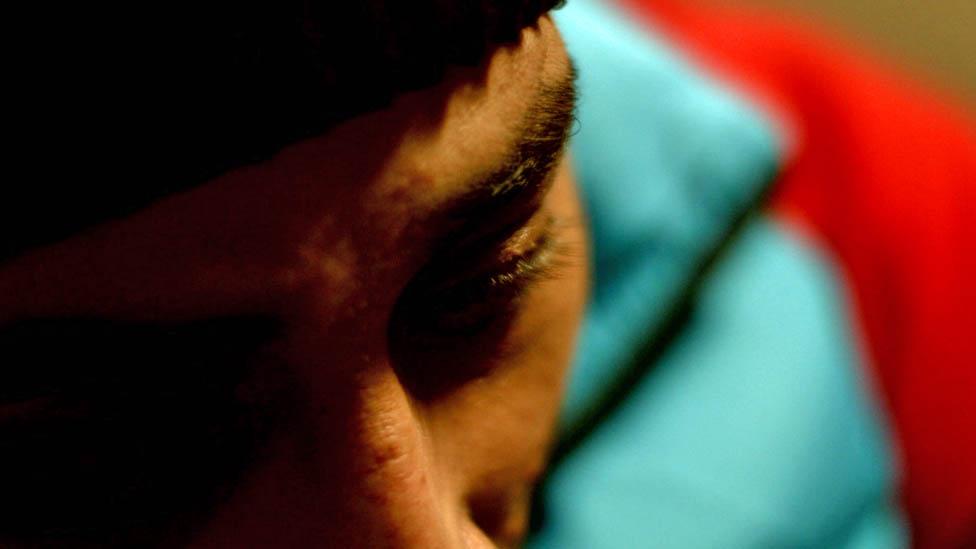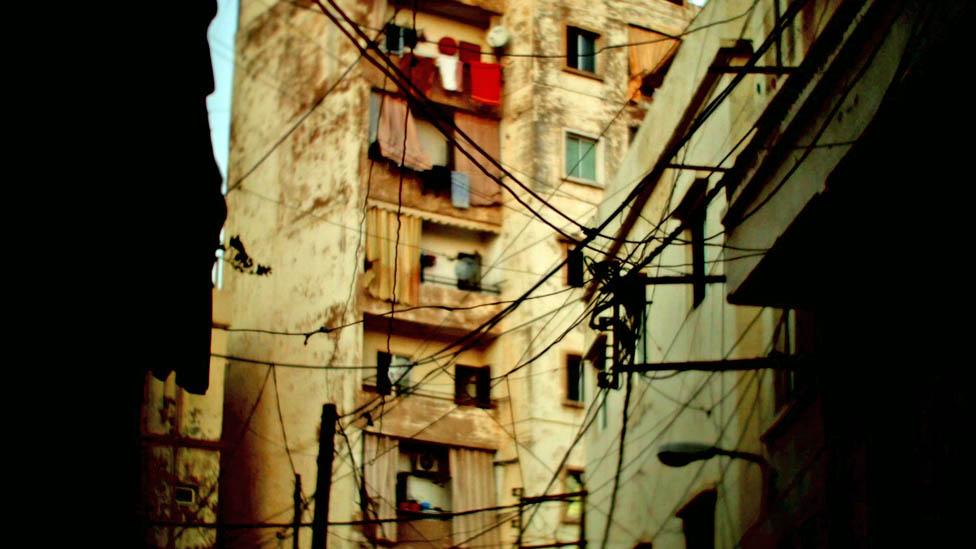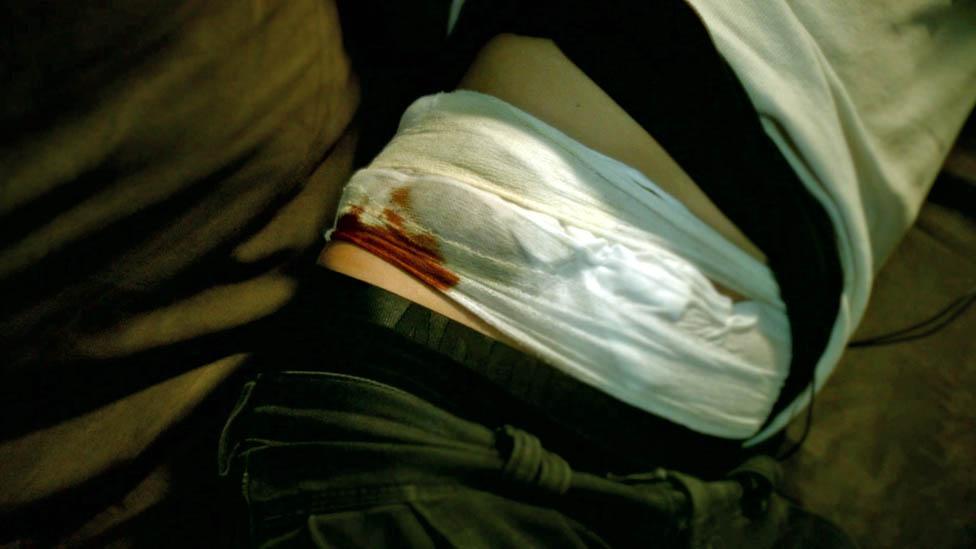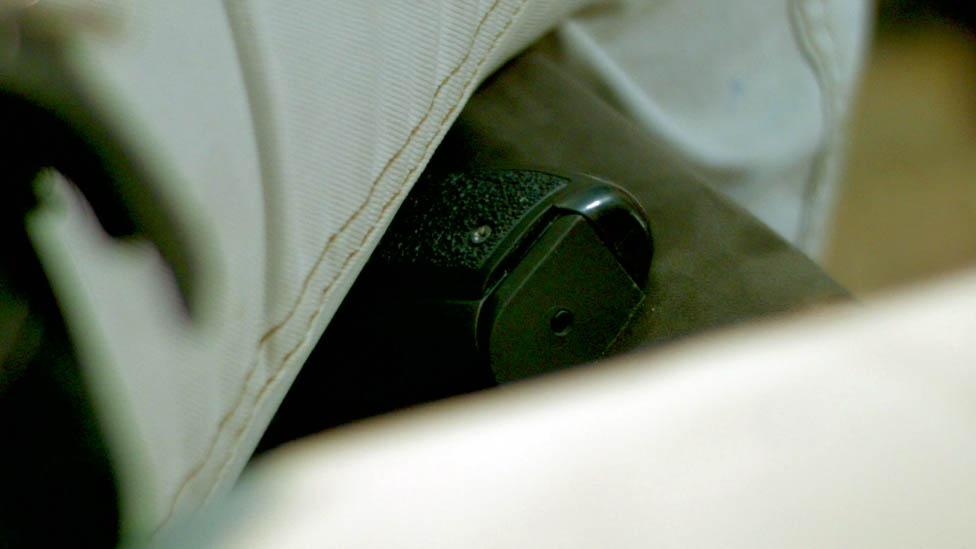Meeting an organ trafficker who preys on Syrian refugees
- Published

There's a glint of pride in Abu Jaafar's eyes as he explains what he does for a living.
He used to work as a security guard in a pub but then he met a group which trades in organs. His job is to find people desperate enough to give up parts of their body for money, and the influx of refugees from Syria to Lebanon has created many opportunities.
"I do exploit people," he says, though he points out that many could easily have died at home in Syria, and that giving up an organ is nothing by comparison to the horrors they have already experienced.
"I'm exploiting them," he says, "and they're benefitting."
His base is a small coffee shop in one of the crowded suburbs of southern Beirut, a dilapidated building covered by a plastic tarpaulin.
"I know what I'm doing is illegal, but I'm helping people, that's how I see it."
At the back, a room behind a rusty partition is stuffed with old furniture and has budgerigars singing in cages in each corner.
From here he has arranged the sale of organs from about 30 refugees in the last three years, he says.
"They usually ask for kidneys, yet I can still find and facilitate other organs", he says.
"They once asked for an eye, and I was able to acquire a client willing to sell his eye.
"I took a picture of the eye and sent it to the guys by Whatsapp for confirmation. I then delivered the client."
The narrow streets in which he operates are crammed with refugees. Around one in four people in Lebanon today have fled the conflict across the border in Syria.
Most aren't allowed to work under Lebanese law, and many families barely get by.
Among the most desperate are Palestinians who were already considered refugees in Syria, and so are not eligible to be re-registered by the UN refugee agency when they arrive in Lebanon. They live in overcrowded camps and receive very little aid.
Almost as vulnerable are those who arrived from Syria after May 2015, when the Lebanese government asked the UN to stop registering new refugees.
"Those who are not registered as refugees are struggling," Abu Jaafar says. "What can they do? They are desperate and they have no other means to survive but to sell their organs."

Some refugees beg on the streets - particularly children. Young boys shine shoes, dodge between cars in traffic jams to sell chewing gum or tissues through the windows, or end up exploited as child labour. Others turn to prostitution.
But selling an organ is one way to make money quickly.
Once Abu Jaafar has found a willing candidate he drives them, blindfolded, to a hidden location on a designated day.
Sometimes the doctors operate in rented houses, transformed into temporary clinics, where the donors undergo basic blood tests before surgery.
"Once the operation is done I bring them back," he says.
"I keep looking after them for almost a week until they remove the stitches. The moment they lose the stitches we don't care what happens to them any longer.
"I don't really care if the client dies, I got what I wanted. It's not my problem what happens next as long as the client got paid."
His most recent client was a 17-year-old boy who left Syria after his father and brothers were killed there.
He's been in Lebanon for three years with no work and mounting debt, struggling to support his mother and five sisters.
So, through Abu Jaafar, he agreed to sell his right kidney for $8,000 (£6,250).

Two days later, clearly in pain despite taking tablets, he was alternately lying down and sitting up on a tattered sofa, trying to get comfortable.
His face was covered in a sheen of sweat and blood had seeped through his bandages.
Abu Jaafar won't reveal how much he made from the deal. He says he doesn't know what happens to the organs after they have been removed, but he thinks they're exported.
Across the Middle East there's a shortage of organs for transplant, because of cultural and religious objections to organ donation. Most families prefer immediate burial.
But Abu Jaafar claims there are at least seven other brokers like him operating across Lebanon.
"Business is booming," he says. "It's growing and not decreasing. It definitely boomed after the Syrian migration to Lebanon."
He knows what he does is against the law but doesn't fear the authorities. In fact he is brazen about it. His phone number is spray-painted on the walls near his home.
In his neighbourhood, he is both respected and feared. As he walks around people stop to joke and argue with him.
He has a handgun tucked under his leg as we talk.

"I know that what I am doing is illegal but I am helping people", he says.
"That's how I perceive it. The client is using the money to seek a better life for himself and his family.
"He's able to buy a car and work as a taxi driver or even travel to another country.
"I am helping those people and I don't care about the law."
In fact, he says, it's the law that lets many refugees down by restricting access to work and aid.
"I am not forcing anyone to undertake the operation," he says. "I am only facilitating based on someone's request."
He lights a cigarette and raises an eyebrow.
"How much for your eye?" he asks.
Abu Jaafar is not his real name - he would only agree to talk to the BBC on condition of anonymity.

Join the conversation - find us on Facebook, external, Instagram, external, Snapchat , externaland Twitter, external.